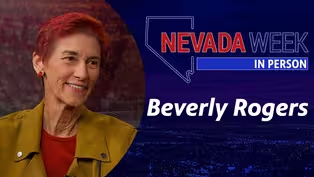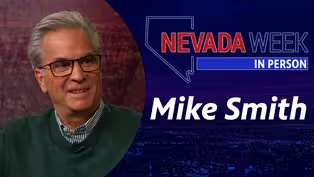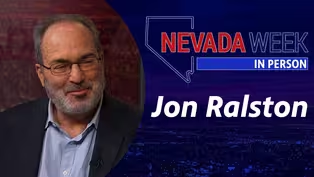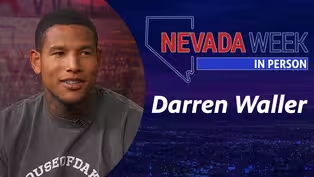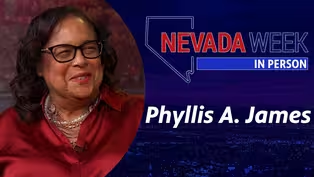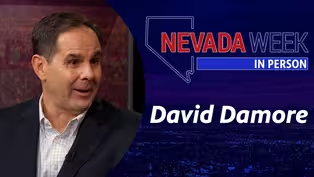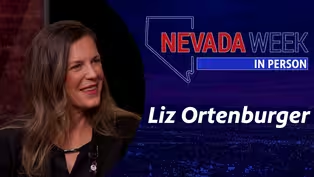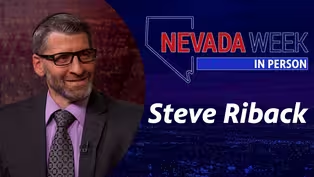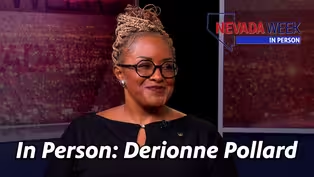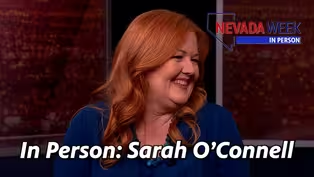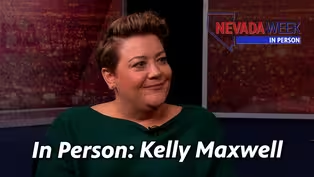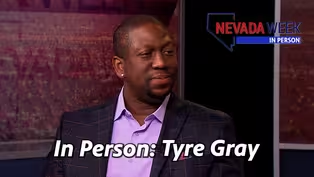
Nevada Week In Person | Shelley Berkley
Season 1 Episode 47 | 14mVideo has Closed Captions
One-on-one interview Senior Vice President for Touro University Shelley Berkley.
One-on-one interview Senior Vice President for Touro University Shelley Berkley.
Problems playing video? | Closed Captioning Feedback
Problems playing video? | Closed Captioning Feedback
Nevada Week In Person is a local public television program presented by Vegas PBS

Nevada Week In Person | Shelley Berkley
Season 1 Episode 47 | 14mVideo has Closed Captions
One-on-one interview Senior Vice President for Touro University Shelley Berkley.
Problems playing video? | Closed Captioning Feedback
How to Watch Nevada Week In Person
Nevada Week In Person is available to stream on pbs.org and the free PBS App, available on iPhone, Apple TV, Android TV, Android smartphones, Amazon Fire TV, Amazon Fire Tablet, Roku, Samsung Smart TV, and Vizio.
Providing Support for PBS.org
Learn Moreabout PBS online sponsorshipMore from This Collection
Nevada Week In Person goes beyond the roundtable discussion of Nevada Week with guests for a more casual conversation about their personal passions, new projects and compelling stories that are overlooked in the flurry of the news cycle.
Nevada Week In Person | Beverly Rogers
Video has Closed Captions
One-on-one interview with Rogers Foundation chair Beverly Rogers. (14m)
Nevada Week In Person | Mike Smith
Video has Closed Captions
One-on-one interview with Las Vegas Sun political cartoonist Mike Smith. (14m)
Nevada Week In Person | Jon Ralston
Video has Closed Captions
One-on-one interview with The Nevada Independent CEO Jon Ralston. (14m)
Nevada Week In Person | Darren Waller
Video has Closed Captions
One-on-one interview with Las Vegas Raider tight end Darren Waller. (14m)
Nevada Week In Person | Phyllis A. James
Video has Closed Captions
One-on-one interview Phyllis A. James. (14m)
Nevada Week In Person | David Damore
Video has Closed Captions
One-on-one interview with Chair of the Department of Political Science at UNLV David Damor (14m)
Nevada Week In Person | Liz Ortenburger
Video has Closed Captions
One-on-one interview with SafeNest CEO Liz Ortenburger. (14m)
Nevada Week In Person | Steve Riback
Video has Closed Captions
One-on-one interview with Las Vegas Metro Police Lieutenant Steve Riback. (14m)
Nevada Week In Person | DeRionne Pollard
Video has Closed Captions
One-on-one interview Nevada State College President DeRionne Pollard. (14m)
Nevada Week In Person | Sarah O’Connell
Video has Closed Captions
One-on-one interview with Director of Eat More Art LLC Sarah O’Connell. (14m)
Nevada Week In Person | Kelly Maxwell
Video has Closed Captions
One-on-one interview with Baby’s Bounty Executive Director Kelly Maxwell. (14m)
Nevada Week In Person | Tyre Gray
Video has Closed Captions
One-on-one interview with Nevada Mining Association President Tyre Gray. (14m 1s)
Providing Support for PBS.org
Learn Moreabout PBS online sponsorshipThe first woman to represent Nevada's 1st Congressional District, an office she held for seven terms, former Congresswoman, now Senior Vice President of External Affairs for Touro University, Shelley Berkley joins us this week for Nevada Week In Person .
♪♪♪ Support for Nevada Week In Person is provided by Senator William H. Hernstadt.
-Welcome to Nevada Week In Person .
I'm Amber Renee Dixon.
Born in New York, she moved to Las Vegas at 11 years old, graduating from Valley High School, then UNLV before getting her law degree at the University of San Diego.
Before her 14 years in Congress, she served in Nevada's State Legislature and on the Board of Regents and continues to address the healthcare needs of Nevadans through her role with Touro University.
Shelley Berkley, thank you for joining Nevada Week In Person .
-Thank you, Amber.
It's truly a pleasure to be here.
And thank you so much for inviting me.
-I was telling you off camera how elegant you look, how you've always struck me with your elegance.
And I asked you if you were inspired by anybody, and you said no.
-No.
I just, I grew up in Las Vegas.
I always love to see women dressed well.
I come from a very modest background, and there was never a lot of money for anything.
But I always managed to make sure everything matched.
And so I always think it's a bit of a sickness.
But I guess I did it when I was 12, and now I'm doing it when I'm in my 70s.
So I've become kind of used to it.
-Here in Las Vegas, your father was a waiter, you said?
-My father started when we first moved to town.
My dad was a waiter at the old Sands Hotel; and by the time the Sands was imploded, he was the longest-serving employee.
But he also had been the maitre d' of the famed Copa Room for many years.
So we truly made a life for ourselves in the middle of the desert.
-What did you learn from him?
-You know, neither one of my parents graduated high school.
But in our family, it didn't matter if you were pretty or you were popular.
I was both of those things, by the way.
-I imagine.
-It mattered that you got good grades so you could make something of yourself.
And I think what I learned from both of my parents was the value of hard work.
My dad worked until he was 87 years old, and I think that's something.
I can't even imagine retiring.
I'm a working woman.
I come from a working family, and I enjoy it.
It's-- I think it's an important thing to do, to feel not only valued, but to feel purposeful.
And I think my parents taught me that.
-And you are working a whole lot right now.
What led you to Touro University, and what are you doing?
-Well, after I lost the Senate race and feeling terribly sorry about myself and sitting on my family room couch trying to figure out what am I going to do with the rest of my life-- I love public service.
I like to give back to the community and to our country, but I don't have an office to do that with anymore.
So after a while of recovering from the election and, of course, coming back home from DC where I had been for a number of years by then, I received this fortuitous phone call out of the blue from Touro University.
And they asked me if I would be interested in being the CEO.
Now, I knew they were looking for someone, because my predecessor was Mike Harder.
Carol Harder who was president of UNLV, this was her husband.
And I knew that he wanted to retire, but he promised he wouldn't leave until they found a replacement.
So I told him, I said, I have no academic leadership background whatsoever.
Medical background, none other than being married to a doctor, which I don't think qualifies you to run a medical school.
And they said that they knew that, but they still wanted a chance to talk to me about it.
So after about two weeks of I flew to New York, they flew here, I flew to my California campus, I flew back home, I realized that at my stage in life, when would I ever have the opportunity to do something so outside of my wheelhouse, that I really would be doing something unique and different for me.
And I decided to take the job, and our admission numbers are wild, people applying.
I'll give you an example, Amber.
We had 4,200 applications for 180 slots in the medical school.
That is extraordinary.
So we can afford to be very particular about who we admit.
And if we admit you, we expect you to graduate, and they do.
And so we are graduating 180 future doctors, encouraging them to stay in Nevada.
The other programs, generally, are local people that are going to stay.
These are jobs that are desperately needed in the healthcare industry.
So when you graduate, chances are you already have a job lined up.
Now with the medical school, of course, you've got three more years of residency before you could actually practice, but-- -And that's an issue here in Nevada.
-It's a huge issue.
We need more residency programs in order to keep our graduates from medical school here in town.
And last year we had 55 of our graduates stay here, and that's because there are residency programs for them to join.
-What needs to happen in order for there to be more residency programs in Nevada?
-Well, the governor has to include funding for residency programs in the budget, the legislature has to approve the request, and then the money-- It's been-- Under Brian Sandoval, we had the first $10 million.
And it is ensuring our future in the-- ensuring the future of health care in this state.
And as you know, we are very, very short of physicians in this state, particularly primary care physicians.
And 60% of my students that graduate from Touro end up going into primary care.
So we are doing everything we can to eliminate the challenges that we have in healthcare.
-Statistically, if you get to do your residency somewhere, you end up staying there, so-- -70% of doctors that end up staying where they're doing their residency program, where their residency program is.
Now, if we don't have them here, they're forced.
It's not-- They may not even want to leave town, but they do.
They have to, to get their residency requirement.
And 70% of them aren't coming back.
-Something else neat that you worked with Touro University on recently, teaming up with Metro law enforcement to train them medically.
Why?
How did that idea come to you?
-Actually, it was suggested that-- No, I'll take that back.
I read it in the newspaper that Metro was, thanks to the Engelstad Foundation, they were building their facility, and part of the training was going to be medical, that if, God forbid, there's another similar horrible situation like October 1, they-- you cannot, medical personnel cannot come on the scene of an active shooting situation.
But the police are there, as they always are, as first responders.
If we can train them-- If they come upon somebody that they can quickly save, we're training them to be able to do that.
So I read in the newspaper that the Engelstad Foundation was funding Metro and having a brand new facility and all, and in that facility, they were going to do medical.
I thought to myself, They don't have to do the medical part.
I'll do the medical part.
And again, thanks to the Engelstad Foundation and their vision for this community, they funded us so that we can create the training programs that are needed for Metro.
Now it has been such a success, that we're going to be asking for more training money.
But in addition to that, all of the other police departments other than Metro that are operating throughout the valley-- North Las Vegas, Henderson-- they all want the training as well.
And so I'm glad it's wildly successful.
And the beauty of this is our Sheriff-elect, Kevin McMahill, when he was undersheriff, he was the one that I worked with at Metro to put this program together.
So now that he's going to become sheriff, he's very familiar with the program.
He helped create it, and I know he's going to be a big supporter.
-About your time in Congress, you called the Veterans Administration Medical Center in North Las Vegas your proudest accomplishment.
-It is.
-Why does it remain that?
-Well, it was-- I had and Southern Nevada had several hundred thousand, I would say close to 300,000 veterans in Southern Nevada with no real healthcare facilities.
We had the Addeliar Dell Guy Healthcare Clinic, and I-- When I first got into Congress, and I was on the Veterans Affairs Committee, I spent a lot of time with my vets here at home.
And I came to realize that, yes, they could probably go to any hospital for their healthcare needs.
They wanted to be together.
There was a commonality of interests.
They could, you know, sit there in the lobby and have coffee and doughnuts and talk to people that they had either served with or understood the challenges that veterans have, especially as they get older.
And so I-- We originally got the Lady Vets in town, mostly World War II and Korea back then.
They came to me, and they said that they needed a mammogram machine.
And we got the mammogram machine, and we did a ribbon cutting and everything else.
And I made a quip when I was at the podium welcoming everybody, thanking everybody, saying that we're gonna get-- Next time we're getting an MRI machine also.
Somebody came over to me at that press conference.
They said, You need to think bigger.
Bigger than an MRI machine?
And they said, Yes, you need a hospital here, because all of your vets, if they're sick, have to go to Long Beach.
And that's when all of a sudden the light went off in my head.
And I said, Why shouldn't Southern Nevada have a full-service VA hospital?
And it became the passion of not only my passion, but the passion of my office.
And we worked very diligently and very single focused, and we got the funding for the VA hospital in North Las Vegas.
It's a perfect location.
It is a beautiful facility.
And they're adding on; they're creating a women's pavilion.
And that's gonna serve the Lady Vets.
So that all started with a mammogram machine.
And now I, when I go over there, I'm just so inspired by what I see.
-Anything you would have done differently in your time in Congress, perhaps your actions that led to the House Ethics investigation?
-Well, you know, it's interesting you should bring that up, because I-- It probably is what submarined my Senate run.
And it was so easily explainable, and we did such a lousy job explaining what happened.
I got a phone call from UMC in my capacity as the Congresswoman-- and UMC is right in the heart of my congressional district, or was in my congressional district-- saying, We have this one and only kidney transplant center for the entire state, and there's a possibility that it might be closed down because we had one extra death.
And so-- because you have to keep your numbers-- Obviously, you can't be a mill where people die.
-We're getting close to having to wrap you up.
-Okay.
Well, anyway, my husband's group, where there's 33 kidney specialists in my husband's group, have the dialysis contract at UMC.
And the way the commercials were spun and the way the Ethics complaint occurred, it seemed as if I was benefiting him.
But if one thought about that, if you have a transplant, you're off of dialysis.
So in the end, I was exonerated, but it was after the election.
And you know what?
I'm a great believer that things happen the way they're supposed to.
We have a wonderful Senator there now, two wonderful Senators, and I'm very happy at Touro.
So life works out the way it's supposed to work.
-And look at the work you're doing now.
-And the kidney program was saved.
And now I am the vice-chairman of the Nevada Donor Network, and we're in the process of putting together a huge transplant facility.
-Shelley Berkley, thank you so much for joining Nevada Week In Person.
-It's my pleasure.
Thank you so much.
♪♪♪

- News and Public Affairs

Top journalists deliver compelling original analysis of the hour's headlines.

- News and Public Affairs

FRONTLINE is investigative journalism that questions, explains and changes our world.












Support for PBS provided by:
Nevada Week In Person is a local public television program presented by Vegas PBS
